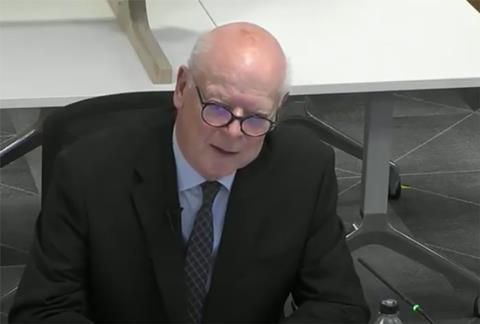Expert witness Paul Hyett says it would have been āprudentā for Studio E to hire specialist help
Architect Studio E was āimprudentā not to have appointed a specialist fire consultant when it took on the Grenfell Tower refurbishment project, the inquiry into 2017ās fire that claimed 72 lives was told.
Expert witness Paul Hyett said given Studio Eās lack of experience in high-rise residential overcladding āit would have been important for them to get a fire consultant and to use that fire consultant properlyā.

Hyett, a former RIBA president who retired in June after 16 years as a principal at HKS Architects to set up his own consultancy, began what is expected to be three days of evidence to the inquiry on Monday afternoon.
He faced a series of detailed questions from inquiry barrister Richard Millet QC about architectsā training in ŠŌ°ÉµēĢØ Regulations and fire safety and the level of competence that could reasonably be expected of them.
Millett first asked him whether Studio E should have refused to take on the project since it had no experience of high-rise residential overcladding.
Hyett replied: āWe are designers and we are trained to design and, through design, to solve problems. So the fact an architect hasnāt done, in this case, a building of the scale and type at Grenfell doesnāt suggest to me thereās an immediate problem.
āThe important thing is to understand that code has to be researched, has to be understood, has to be applied and, where advice is needed from other specialists ā either architects with particular experience in that area brought in to the office as subcontractors or ā¦ other consultants like a specialist fire consultant ā architects have to know that they must, in researching the project, get the right experience into that project as it develops.ā
Asked whether the āstandard of service expectedā could have been achieved by Studio E through CPD or research alone he said: āYes. Iām in no doubt that it could.ā
Millett then asked him whether he would expect a firm in Studio Eās position to have hired a specialist faƧade engineer or consultant.
Hyett replied: āNo. I would expect them to look very hard at the problem to satisfy themselves ā or to question themselves whether they had resource in the office that could do the research necessary and develop the expertise necessary, or whether they should make a strategic hire.ā
Millett asked how early in the project this should happen, to which he replied: āLike, at the beginning.ā He then explained this was because the āfoundations of the project would need to be right from the beginningā and because ātime is ticking fast on a project once the instruction comesā.
He was asked specifically whether Studio E project associate Neil Crawford should have considered employing specialist help because he had used a faƧade engineer, Arup, for the cladding on an office project in Manchester he led for his previous practice, Foster & Partners in 2004.
Hyett said it was āperfectly reasonable to proceed without a specialist faƧade specialist on an overcladding projectā.
Millett then asked whether it was āunreasonableā for Studio E not to have hired a fire consultant.
Hyett replied: āI donāt think theyāre absolutes but the experience Studio E had would suggest this is a building type they have not done before. Itās certainly pretty substantial and complex. One would have to make an extremely good argument for not having a fire consultant.
āThat argument might be, āWell, weāve been doing these for 15 years and we know all about it , weāve got some highly specialised architects in the office who have done 10 of these beforeā.
āBut looking at it from where they were coming from, I think that it would have been very, very prudent ā it would have been important for them to get a fire consultant and to use that fire consultant properly.ā
Millett pushed him further, asking whether it was therefore imprudent not to have hired a specialist fire consultant. Hyett replied: āThat particular firm? Yes.
āIām not saying that no architect could have proceeded without, but that particular firm, a partner in that firm ā when we take on work, weāve got to be confident that we can deliver what is required. We have to look at our resources, we have to look at the skill, the size, and we have to satisfy ourselves we can do that work and do it with a competence and a confidence. I wouldnāt have wanted to proceed on that without getting a fire consultant.ā
He concluded: āIf you think you can address the problem as an architect, as a designer, then I think itās reasonable to proceed. But you would have to make the case for why you wouldnāt be going to a specialist. And I think from where they sat I would, as a partner, have said, āWe need a fire consultant on thisā.ā
The inquiry continues.























No comments yet